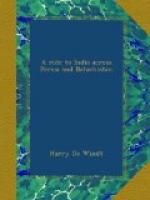Resht bears the unpleasant reputation of being the most unhealthy city in Persia. Its very name, say the natives, is derived from the word rishta, “death.” “If you wish to die,” says a proverb of Irak, “go to Resht!” The city, which had, at the beginning of the century, a population of over sixty thousand inhabitants, now has barely thirty thousand. This certainly looks as if there were some truth in the foregoing remarks; and there is no doubt that, on the visitation of the plague about ten years ago, the mortality was something frightful. A great percentage of deaths are ascribed to Resht fever—a terrible disease, due to the water and the exhalations from the marshes surrounding the city. It is certainly the dampest place in the world. The sun is seldom seen, and one’s clothes, even on a dry, rainless day, become saturated with moisture.
The town is, nevertheless, prettily situated in a well-wooded country. It would almost be imposing were it not for the heavy rains and dews, which cause a rapid decay of the buildings. The latter are mostly of red brick and glazed tiles.
Resht is the depot for goods to and from Persia—chiefly silks. Tobacco is also grown in yearly increasing quantities. Several Russian firms have opened here for the manufacture of cigarettes, which, though they may find favour among the natives, are too hot and coarse for European tastes. They are well made and cheap enough—sevenpence a hundred.
In addition to the native population, Resht contains about five hundred Armenians, and a score or so of Europeans. Among the latter are a Russian and a British vice-consul. To the residence of the latter we repaired. Colonel Stewart’s kindness and hospitality are a byword in Persia, and the Sunday of our arrival at Resht was truly a day of rest after the discomfort and privations we had undergone since leaving Baku.
[Footnote A: Isvostchik, a cab-driver.]
[Footnote B: “Tchornigorod,” or “Black Town,” so called from the smoke that hangs night and day over the oil-factories.]
[Footnote C: Russian cabbage-soup.]
CHAPTER III.
RESHT—PATCHINAR.
Day broke gloomily enough the morning following the day of our arrival at Resht. The snow, still falling fast, lay over two feet deep in the garden beneath my window, while great white drifts barred the entrance-gates of the Consulate. About eight o’clock our host made his appearance, and, waking me from pleasant dreams of sunnier climes, tried to dissuade me from making a start under such unfavourable circumstances. An imperial courier had just arrived from Teheran, and his report was anything but reassuring. The roads were in a terrible state; the Kharzan, a long and difficult pass, was blocked with snow, and the villages on either side of it crowded with weather-bound caravans.




